Passover - Let's Get It Right.
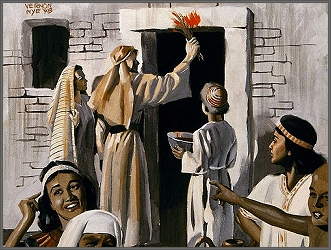
Egyptians mocking the Hebrews before passover.
Hebrew Pesach Timeline Chart:
(Night of Protection, Passover, Feast of Unleavened Bread)
This article will cover the timing of events that happen during the seven days of Unleavened Bread which are the Spring Festival Days. The first thing to note is the meaning of the Hebrew word "Pesach" normally translated into English as "Passover." Notice in Scripture:
(Leviticus 23:5) (JPS). [1] In the first month, on the fourteenth day of the month at dusk, is the ETERNAL's Passover (#H6453).
The English word "Passover" comes from the Hebrew word "pecach" which in common English usage is "Pesach" and is pronounced peh'sakh. Gesenius' [2] states that #H6453 means: "a sparing, immunity from penalty or calamity." It comes from the root word #H6452 which means: "to pass over, to spare." Since the Egyptians were not spared or protected, all their firstborn of man and beast were killed. However, the firstborn of the Hebrews were spared and were protected from the sting of death when the ETERNAL passed through the land (Exodus 12:12). Thus, the night that is typically called "Passover" is actually the "Night of Protection."
I prefer saying the "Night of Protection" rather than "Passover Night" since Passover is connected in Strong's [3] to the word "victim" and this, incorrectly, opens the door to the "passover lamb" of the church in Rome.
Strong's states that #H6453 Pesach is: "a pretermission, [4] i.e. exemption [5] used only technically of the Jewish Passover (the festival or the victim)."
By referring to the "Jewish Passover," Dr. Strong is relating to the meaning of the word "Pesach" that is used in modern churchanity, whereas Dr. Gesenius is using the original Hebrew meaning. Furthermore, since it is Scripturally unlawful to have a Pascal Sacrifice today while there is no Temple, remembering the night as Passover seems out of place. The night when the ETERNAL went through the land to protect His chosen people was indeed a night of protection. Since the ETERNAL does not have a specific name for that special event, it seems that it be should be called the "Night of Protection" instead of "Passover" especially since "Pesach" means "to pass over, to spare, a sparing, immunity from penalty or calamity."
The written Hebrew does not contain chapter and verse breaks; they were later added to an English text by a translator of the catholic church of Rome. Since the catholic translators obviously did not refer to the Hebrew, this adds unnecessary confusion to reading the Scriptures. In the next set of Scriptures in Exodus this produced a run-on effect as if all eight (8) of these verses occurred together. Carefully read the first set of Scriptures:
(Exodus 12:12-14) (KJV) 12For I will go through the land of Egypt in that night [14th], and will smite all the firstborn in the land of Egypt, both man and beast; and against all the 'gods' of Egypt I will execute judgments: I am the ETERNAL. 13And the blood shall be to you for a token upon the houses where ye are; and when I see the blood, I will pass over you, and there shall no plague be upon you to destroy you, when I smite the land of Egypt. 14And this day [the 14th] shall be unto you for a memorial, and ye shall keep it a Feast to the ETERNAL; throughout your generations ye shall keep it a feast by an ordinance for ever.
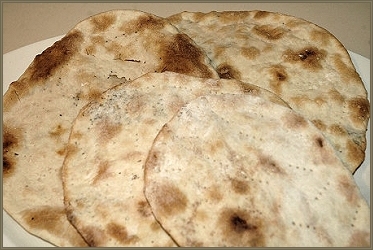
Unleavened bread must be eaten daily for seven days.
(Exodus 12:15) (KJV) Seven days shall ye eat unleavened bread; howbeit the first day ye shall put away leaven out of your houses; for whosoever eateth leavened bread from the first day until the seventh day, that soul shall be cut off from Israel.
(Exodus 12:16-17) (KJV) 16And in the first day there shall be to you a holy [set-apart] convocation, and in the seventh day a holy [set-apart] convocation; no manner of work shall be done in them, save that which every man must eat, that only may be done by you. 17And ye shall observe the Feast of Unleavened Bread; for in this self same day have I brought your hosts out of the land of Egypt; therefore, shall ye observe this day throughout your generations by an ordinance for ever.
(Exodus 12:18-19) (KJV) 18In the first month, on the fourteenth day of the month at even, ye shall eat unleavened bread, until the one and twentieth day of the month at even. 19Seven days shall there be no leaven found in your houses; for whosoever eateth that which is leavened, that soul shall be cut off from the congregation of Israel, whether he be a sojourner or one that is born in the land.
A Contradiction?
Do you see the problem? It appears these verses are full of contradictions. They state that for seven days unleavened bread shall be eaten. Then they state that the 1st and 7th are commanded assemblies (holy convocations) in which no work is to be done. Yet, by the first (1st) day we have to rid our homes of leaven and that is work. Note that the days of unleavened bread last UNTIL the 21st day. That is at the beginning of the 21st and not the end of the 21st, therefore, the 21st is not part of the Days of Unleavened Bread. Not to worry, our CREATOR fully explains these apparent contradictions. The next set of Scriptures states:
(Exodus 13:6-7) (KJV) 6Seven days thou shalt eat unleavened bread, and in the seventh day shall be a feast to the ETERNAL. 7Unleavened bread shall be eaten throughout the seven days; and there shall no leavened bread be seen with thee, neither shall there be leaven seen with thee in all thy borders.
These all agree that unleavened bread is eaten for seven days and the 7th day is a Commanded Assembly (holy convocation). Nothing is mentioned about a lamb or the first day of the Days of Unleavened Bread. The next scripture states:
(Exodus 34:18) (KJV) The feast of unleavened bread shalt thou keep. Seven days thou shalt eat unleavened bread, as I commanded thee, at the time appointed in the month Abib, for in the month Abib thou camest out from Egypt."
This Scripture Makes Two Points:
1. The Feast of Unleavened Bread shall be kept.
2. There are seven days that unleavened bread shall be eaten.
There is no mention of the time span for the Feast of Unleavened Bread; it only states that unleavened bread is to be eaten for seven days! We must remember that the written Hebrew does not contain chapter and verse breaks. They were added later to an English text by a translator of the catholic church in Rome. Since the translator probably did not know Hebrew, it added unnecessary confusion to reading the Scriptures.
In the next set of Scriptures in Leviticus, this also produced a run-on effect as if all four (4) of these verses occurred together, whereas, in actuality, they cover a seven (7) day period.
(Leviticus 23:5-6) (KJV) 5In the fourteenth day of the first month at even is the ETERNAL's passover[6]. 6And on the fifteenth day of the same month is the feast of unleavened bread unto the ETERNAL: seven days ye must eat unleavened bread.
(Leviticus 23:7-8) (KJV) 7In the first day ye shall have an holy convocation: ye shall do no servile work therein. 8But ye shall offer an offering made by fire unto the ETERNAL seven days: in the seventh day is an holy convocation: ye shall do no servile work therein. And on the fifteenth day of the same month is the Feast of Unleavened Bread unto the ETERNAL; seven days ye shall eat unleavened bread. In the first day (of the Feast of Unleavened Bread) ye shall have a holy convocation [commanded assembly]; ye shall do no manner of servile work.
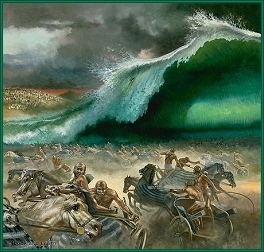
The Hebrews get out of Egypt.
Which Day did the Hebrews Leave Egypt?
There is a lot of confusion over which day the Hebrews left Egypt; was it on the 14th or the 15th? This confusion is partially due to the chapter verse breaks. However, the answer is plainly stated in the following verses. These verses clearly show that the Night of Protection is on the fourteenth and the First Day of Unleavened Bread is on the fifteenth.
(Numbers 33:1-4) (KJV) 1These are the journeys of the children of Israel, which went forth out of the land of Egypt with their armies under the hand of Moses and Aaron. 2And Moses wrote their goings out according to their journeys by the commandment of the ETERNAL: and these are their journeys according to their goings out. 3And they departed from Rameses in the first month, on the fifteenth day of the first month; on the morrow [#H4283] after the passover the children of Israel went out with an high hand in the sight of all the Egyptians. 4For the Egyptians buried all their firstborn, which the ETERNAL had smitten among them: upon their 'gods' also the ETERNAL executed judgments.
The English word "morrow" comes from the Hebrew word "mochorath." Strong's states that, "#H4283 is the feminine form from #H4279; the morrow or tomorrow. For #H4279 "machar, i.e. the morrow, usually (adverb) tomorrow; (indefinitely) hereafter." In addition, Gesenius states that the Hebrew form of the word used in (Numbers 33:3) (and other verses he lists) means not just the "morrow" but the "morrow of that day." Thus, it seems obvious that if Pesach comes on the fourteenth, then the "morrow of that day" is the fifteenth. The fifteenth which begins at sunset (at the end of the daylight portion of the fourteenth) is the "morrow of that daylight portion of the Pesach" therefore that is the time that they left Egypt.
These days were kept correctly in the past and they will be kept correctly in the future, at the new Third Temple in the upcoming Third Temple era. Notice how the Prince, King David, and the Priest/Prophet, Elijah, will work together in harmony, not just for Pesach and Unleavened Bread but for all of the Festival Days.
(Ezekiel 45:16-17) (NIV) 16All the people of the land will be required to give this special offering to the prince in Israel. 17It will be the duty of the prince to provide the burnt offerings, grain offerings and drink offerings at the festivals, the New Moons and the Sabbaths, at all the appointed festivals of Israel. He will provide the sin offerings, grain offerings, burnt offerings and fellowship offerings to make atonement for the Israelites.
(Ezekiel 45:18-19) (NIV) 18This is what the Sovereign Almighty says: In the first month on the first day you are to take a young bull without defect and purify the sanctuary. 19The priest is to take some of the blood of the sin offering and put it on the doorposts of the temple, on the four corners of the upper ledge of the altar and on the gateposts of the inner court.
Returning to the theme of the Pesach and Unleavened Bread and we see that Pesach is the first day of a seven-day period.
(Ezekiel 45:21-24) (KJV) (Tanakh)[7] 21In the first month, in the fourteenth day of the month, ye shall have the passover, a feast of seven days; unleavened bread shall be eaten. 22And upon that day shall the prince prepare for himself and for all the people of the land a bullock for a sin offering. 23And seven days of the feast he shall prepare a burnt offering to the ETERNAL, seven bullocks and seven rams without blemish daily the seven days; and a kid of the goats daily for a sin offering. 24And he shall prepare a meat offering of an ephah for a bullock, and an ephah for a ram, and an hin of oil for an ephah.
(Ezekiel 45:21-24) (TLB) 21On the fourteenth day of the same month, you shall celebrate the Passover. It will be a seven-day feast. Only bread without yeast shall be eaten during those days. 22On the day of Passover the prince shall provide a young bull for a sin offering for himself and all the people of Israel. 23On each of the seven days of the feast he shall prepare a burnt offering to the ETERNAL. This daily offering will consist of seven young bulls and seven rams without blemish. A male goat shall also be given each day for a sin offering. 24And the prince shall provide a half bushel of grain with each bullock and ram for a meal offering, and three quarts of olive oil.
On the surface these Scriptures also seem to contradict the others we have seen. All together the verses tell us that the first Day of the Feast of Unleavened Bread is on the fifteenth and that all of the Children of Israel shall eat Unleavened Bread for seven days. Nevertheless, in Exodus 12 note that verse 18 states:
(Exodus 12:18) (KJV) In the first month, on the fourteenth day of the month at even, ye shall eat unleavened bread, until the one and twentieth day of the month at even."
Webster's says the word "until" means "up to the time of" or "before some event." Thus, verse fourteen (14) is stating that unleavened bread is eaten from sunset (the beginning of the 14th) until sunset on the 20th (the beginning of the 21st) and that is seven (7) full days. However, the 14th is the "Night of Protection" (Pesach) and you will have completed the work of removing leavening from your premises. Did the CREATOR get confused? Did He allow error to invade His Hebrew Scriptures? Alternatively, do we just need to be diligent and search the Scriptures for it's rightful meaning?
The next round of Scriptures, will clear up these apparent contradictions, and show that the "Feast of Unleavened Bread" is only six (6) of the seven (7) "days of unleavened bread."
(Deuteronomy 16:1-8) (NKJV) 1Observe the month of Abib, and keep the Passover to the ETERNAL your CREATOR, for in the month of Abib the ETERNAL your CREATOR brought you out of Egypt by night. 2Therefore you shall sacrifice the Passover to the ETERNAL your CREATOR, from the flock and the herd, in the place where the ETERNAL chooses to put His name. 3You shall eat no leavened bread with it; seven days you shall eat unleavened bread with it, that is, the bread of affliction (for you came out of the land of Egypt in haste), that you may remember the day in which you came out of the land of Egypt all the days of your life. 4And no leaven shall be seen among you in all your territory for seven days, nor shall any of the meat which you sacrifice the first day at twilight remain overnight until morning. 5You may not sacrifice the Passover within any of your gates which the ETERNAL your CREATOR gives you; 6but at the place where the ETERNAL your CREATOR chooses to make His name abide, there you shall sacrifice the Passover at twilight, at the going down of the sun, at the time you came out of Egypt. 7And you shall roast and eat it in the place which the ETERNAL your CREATOR chooses, and in the morning you shall turn and go to your tents. 8Six days you shall eat unleavened bread, and on the seventh day there shall be a sacred assembly to the ETERNAL your CREATOR. You shall do no work on it.
First, A Recap Of What We've Covered So Far:
1. The "Night of Protection" is a better term for the night the Death Angel passed over and the Hebrews were protected.
2. Unleavened bread is to be eaten for seven days, from the beginning of the 14th day (Pesach) until the end of the 20th which is start of the 21st day.
3. Unleavened bread is to be removed by the end of the 14th day. Thus this is a work and occurs on a workday. Therefore the 14th, which is Pesach, is a day of unleavened bread but not a Feast Day.
4. The Feast of Unleavened Bread begins on the 15th day (the day after Pesach) ending at the beginning of the 21st day. On the first day of the Feast of Unleavened Bread, no work is to be done that day as it is a day of a Commanded Assembly. The first day of the Feast of Unleavened Bread is the day the Children of Israel left Egypt.
5. The Feast of Unleavened Bread lasts six (6) more days with another Commanded Assembly on the 20th (which begins at sunset on the 19th).
6. Thus, unleavened bread is eaten for seven (7) full days. The first day is Pesach followed by six (6) days of the Feast of Unleavened Bread.
7. Since there is presently no Temple, then there is no sacrifice of a lamb[8].
8. For the Night of Protection meal, you may eat the meat of young sheep or goats.
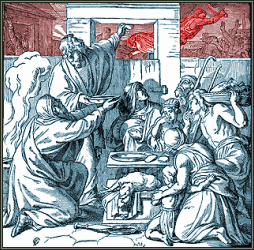
The Angel of Death passed over,
and the Hebrews were protected.
Israel Stayed Inside All Night on the Night of Protection.
On another note, contrary to the movie The Ten Commandments, Moses did not go to Pharaoh during the Night of Protection. Pharaoh previously told Moses that the next time he saw Moses' face that Moses would die. Notice that in Scripture:
(Exodus 10:22-29) (NKJV) 22So Moses stretched out his hand toward heaven, and there was thick darkness in all the land of Egypt three days. 23They did not see one another; nor did anyone rise from his place for three days. But all the children of Israel had light in their dwellings. 24Then Pharaoh called to Moses and said, Go, serve the ETERNAL; only let your flocks and your herds be kept back. Let your little ones also go with you. 25But Moses said, You must also give us sacrifices and burnt offerings, that we may sacrifice to the ETERNAL our CREATOR. 26Our livestock also shall go with us; not a hoof shall be left behind. For we must take some of them to serve the ETERNAL our CREATOR, and even we do not know with what we must serve the ETERNAL until we arrive there. 27But the ETERNAL hardened Pharaoh's heart, and he would not let them go. 28Then Pharaoh said to him, Get away from me! Take heed to yourself and see my face no more! For in the day you see my face you shall die! 29So Moses said, You have spoken well. I will never see your face again.
The Passover Meal:
Roasted Lamb, Unleavened Bread & Bitter Herbs.
According to Scripture, the three elements on the Passover table should be the Passover Lamb, unleavened bread, and bitter herbs.
(Exodus 12:5-8) (NKJV) 5Your lamb shall be without blemish, a male of the first year. You may take it from the sheep or from the goats. 6Now you shall keep it until the fourteenth day of the same month. Then the whole assembly of the congregation of Israel shall kill it at twilight. 7And they shall take some of the blood and put it on the two doorposts and on the lintel of the houses where they eat it. 8Then they shall eat the flesh on that night; roasted in fire, with unleavened bread and with bitter herbs they shall eat it
It is important to note that with Jewish tradition, other dishes have been added to the Passover Feast. However, none of them are mandated by the ETERNAL. In fact most of their meal additions, take away from the ETERNAL by paying homage to certain people, or unrelated events instead. For example, traditionally, three pieces of unleavened bread were served at Passover. The middle piece is broken in half and is eaten after the meal (this is called Afikoman in Hebrew). There is some speculation as to why there are three pieces of matzah. Some suggest that they represent Abraham, Isaac and Jacob. This afikomen ritual has been a part of the Passover ceremony since Second Temple times or later. In Jewish custom, the middle piece is broken in half and the larger of the two broken pieces is carefully wrapped in linen. The little children are asked to close their eyes and the piece is hidden somewhere in the room. As the seder progresses, the children are encourage to search for the lost piece. Once it is found, the child receives a small reward and a small piece of matzah is given to each person at the table to eat. Again, none of these Jewish customs has anything to do with (Exodus 12:8), and so they should be avoided.
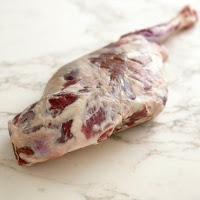
The Passover Lamb.
Passover Lamb Meaning:
Millions of people are misled into believing that the passover lamb, speaks of the redemption and forgiveness of the Hebrews, or to atone for their sins of the past year. They are also taught that it points to the final one-time sacrafice of a coming messiah, that will remove the penalty of sin from all humanity. However, the truth is far different than what we were lied into believing:
(Exodus 12:26-27) (NIV) 26And when your children ask you, What does this ceremony mean to you? 27then tell them, It is the Passover sacrifice to the ETERNAL, who passed over the houses of the Israelites in Egypt and spared our homes when he struck down the Egyptians. Then the people bowed down and worshiped.
Nowhere in the above scripture, is there any mention of redemption, forgiveness, sin, or messiahs. This is what happens when people playing attending church, take in the message, without verifying it for themselves!
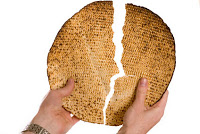
Unleavened Bread.
Unleavened Bread Meaning:
The unleavened bread signifies the haste in which the Israelites left Egypt. They did not have enough time to let their bread rise:
(Exodus 12:39) (NIV) With the dough the Israelites had brought from Egypt, they baked loaves of unleavened bread. The dough was without yeast because they had been driven out of Egypt and did not have time to prepare food for themselves.
(Deuteronomy 16:3) (NIV) Do not eat it with bread made with yeast, but for seven days eat unleavened bread, the bread of affliction, because you left Egypt in haste, so that all the days of your life you may remember the time of your departure from Egypt.
On the day before Passover [preparation day; also sometimes referred to as the First Day of Unleavened Bread], all leaven in homes was to be searched out and removed. This was in remembrance of the Israelites' hasty departure from Egypt.
(Exodus 12:15-18) (KJV) 15Seven days you shall eat unleavened bread. On the first day you shall remove leaven from your houses. For whoever eats leavened bread from the first day until the seventh day, that person shall be cut off from Israel. 16On the first day there shall be a holy convocation, and on the seventh day there shall be a holy convocation for you. No manner of work shall be done on them; but that which everyone must eat, that only may be prepared by you. 17So you shall observe the Feast of Unleavened Bread, for on this same day I will have brought your armies out of the land of Egypt. Therefore you shall observe this day throughout your generations as an everlasting ordinance. 18In the first month, on the fourteenth day of the month at evening, you shall eat unleavened bread, until the twenty-first day of the month at evening.
According to the Hebrew Calendar, a day begins at sundown; so this means that any leavening would have been searched for and removed by mid-day on preparation day. Passover would then begin, once the sun had set.
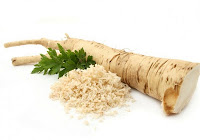
Bitter Herbs.
Bitter Herbs Meaning:
Bitter Herbs is usually fresh ground horseradish, however sometimes romaine lettuce or a plate of bitter vegetables such as radishes, parsley, and celery are served instead. These bitter herbs symbolize the bitterness of Egyptian slavery. Some prefer mild horseradish, although others say that it doesn't serve its purpose (to remind us of the bitterness of slavery) unless it's hot enough to bring tears to the eyes. The Scriptures do not specify which herbs were to be eaten. Such plants as sorrel, dandelions, horseradish, cucumbers, lettuce, water-cress, parsley, endive, chicory, snakeroot, and peppermint have been suggested.
(Numbers 9:11) (KJV) The fourteenth day of the second month at even they shall keep it, and eat it with unleavened bread and bitter herbs.
(Exodus 12:8) (NKJV) Then they shall eat the flesh on that night; roasted in fire, with unleavened bread and with bitter herbs they shall eat it.
(Exodus 1:13-14) (NKJV) 13So the Egyptians made the children of Israel serve with rigor. 14And they made their lives bitter with hard bondage, in mortar, in brick, and in all manner of service in the field. All their service in which they made them serve was with rigor.
In addition, the CREATOR told the Hebrews to stay inside until dawn on the 14th. They had to burn the entire remaining carcass before dawn, and could not go to their tents until morning, if they had stayed with someone else:
(Deuteronomy 16:5-7) (KJV) 5Thou mayest not sacrifice the passover within any of thy gates, which the ETERNAL thy CREATOR giveth thee: 6But at the place which the ETERNAL thy CREATOR shall choose to place his name in, there thou shalt sacrifice the passover at even, at the going down of the sun, at the season that thou camest forth out of Egypt. 7And thou shalt roast and eat it in the place which the ETERNAL thy CREATOR shall choose: and thou shalt turn in the morning, and go unto thy tents.
Therefore, Moses did not go see Pharaoh, but Pharaoh sent his servants to see Moses:
(Exodus 11:8) (NKJV) [Moses speaking] And all these your [Pharaoh's] servants shall come down to me and bow down to me, saying, Get out, and all the people who follow you! After that I will go out. Then he went out from Pharaoh in great anger.
-In other words-
(Exodus 11:8) (TLB) All these officials of yours will come running to me, bowing low and begging, Please leave at once, and take all your people with you. Only then will I go! Then, red-faced with anger, Moses stomped from the palace.
This explains what follows next in Exodus; Pharaoh servants went to Moses:
(Exodus 12:30-32) (NKJV) 30So Pharaoh rose in the night, he, all his servants, and all the Egyptians; and there was a great cry in Egypt, for there was not a house where there was not one dead. 31Then he called for Moses and Aaron by night, and said, Rise, go out from among my people, both you and the children of Israel. And go, serve the ETERNAL as you have said. 32Also take your flocks and your herds, as you have said, and be gone; and bless me also.
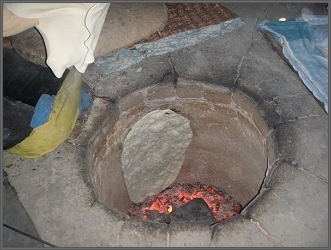
Baking unleavened bread.
Leavening Products.
First we must ask: what is a leavening agent? The Scripture states that the unleavened bread was prepared in haste.
(Deuteronomy 16:3) (KJV) Thou shalt eat no leavened [#H2557] bread with it; seven days shalt thou eat unleavened [#H4682] bread therewith, even the bread of affliction; for in haste didst thou come forth out of the land of Egypt. That thou mayest remember the day when thou camest forth out of the land of Egypt all the days of thy life.
In modern times to make bread the dough is mixed with yeast and allowed time to rise before it is baked. The yeast ferments forming bubbles of carbon dioxide which causes the bread to rise. The clue to what a leavening agent is made from is found in the word haste in the preparation of the bread. When prepared in haste, the bread is not allowed to rise and is therefore unleavened. In ancient times, yeast was not added to the dough as it is today, but the natural yeast spores in the air settled in the dough causing it to rise. In addition, a small portion of the dough could be kept until the next baking to produce what we call "sour dough" bread. Thus, since more time was involved because of not having commercial yeast or leavening agents to add to the dough to hasten rising, the bread prepared in haste was unleavened.
The English word "leavened" comes from the Hebrew word "chametz" (#H2557 Strong's) and it and its root Hebrew word both mean "tasting sour or fermented." The English word "unleavened" comes from the Hebrew word "matstsah" pronounced "mats-tsaw'" is #H4682 in Strong's and means "sweetness or sweet (i.e. not soured or bittered with yeast) as an unfermented cake or loaf that was eaten during the Night of Protection meal because no leaven was used."
There are other agents that will cause bubbles in dough and cause bread to rise; these include (but are not limited to) yeast, baking powder, sodium bicarbonate, and cream of tartar. These items and products containing them are classified as "leavening agents" and are to be removed from our premises.
The English word "bread" is an added word to produce the phrase "unleavened bread" and only the words "leavened" and "unleavened" are in the Hebrew. However, the entire Scriptural context of this discussion of seven days of "unleavened bread" is the preparation of some type of food product that is made in haste. Although the point of discussion in the Scriptures is the preparation of bread, some people add to what is stated and include vinegar and alcoholic drinks (i.e. fermented liquids) to the list of things to avoid during these days.
It is a debatable question as to the timing of when the leavened products should be removed from your property (Exodus 12:15). Should they be removed "on" or "by" the 14th? Strong's or Gesenius' is not much help on the preposition to be used. Some translations say "on" and some say "by." Even in The American Heritage Dictionary, the meanings of the two words overlap. The controversy is cleared up by Scripture:
(Deuteronomy 16:4) (NKJV) And no leaven shall be seen among you in all your territory for seven days, nor shall any of the meat which you sacrifice the first day at twilight remain overnight until morning.
(Deuteronomy 16:7) (NKJV) And thou shalt roast and eat it in the place which the ETERNAL thy CREATOR shall choose: and thou shalt turn in the morning, and go unto thy tents.
Since no leavening is allowed on our property during the seven (7) days of unleavened bread, I have my de-leavening done by the beginning of the 14th day.
One last point concerning leavening and leavened products. Articles of leavening must be gotten rid of not just bagged and taken to the garage and brought back after the Days of Unleavened Bread are completed! The Scriptures say these products are removed from within your borders. You must dispose of them by some method. If you give them to family or friends, you must make sure that you do not eat any thing using them after the 14th. In addition, you must eat some unleavened bread daily for the seven days! To see that in Scripture notice:
(Exodus 12:18-20) (KJV) 18In the first month, on the fourteenth day of the month at even, ye SHALL eat unleavened bread, until the one and twentieth day of the month at even. 19Seven days shall there be no leaven found in your houses; for whosoever eateth that which is leavened, that soul shall be cut off from the congregation of Israel, whether he be a sojourner, or one that is born in the land. 20Ye shall eat nothing leavened; in all your habitations shall ye eat unleavened bread.
(Exodus 13:6-7) (KJV) 6Seven days thou shalt eat unleavened bread, and in the seventh day shall be a feast to the ETERNAL. 7Unleavened bread shall be eaten throughout the seven days; and there shall no leavened bread be seen with thee, neither shall there be leaven seen with thee, in all thy borders.
Spoiling of the Egyptians.
The spoiling of the Egyptians did not occur in Exodus Chapters 3 or 11; it occurred in Exodus 12. Exodus 3 and 11 only contain the promise of what IS going to happen. The spoiling of the Egyptians could not have occurred prior to the "Night of Protection" because the Hebrews were slaves of the Egyptians and slaves just did not go roaming around outside of the slave quarters collecting jewels and gold from their masters. It took the death of the first born on the "Night of Protection" to break the spirit of the Egyptians and bring them to their knees in order for them to allow the Hebrews to leave and to pay them for their service. We will look at Exodus 3 and 11 for these prophecies:
(Exodus 3:20-22) (ASV) 20And I WILL [future tense] put forth My hand, and smite Egypt with all My wonders which I WILL do in the midst thereof. 21And after that he WILL let you go. And I WILL give this people favor in the sight of the Egyptians. And it SHALL [future tense] come to pass, that, when ye go, ye shall not go empty; 22but every woman shall ask of her neighbor, and of her that sojourneth in her house, jewels of silver, and jewels of gold, and raiment; and ye shall put them upon your sons, and upon your daughters; and ye shall spoil the Egyptians.
The action associated with the words "SHALL ASK" and "WILL DO" had not happened at that point, but they were to happen in the next few verses. It had not yet happened in Chapters 3 or 11 but would happen later in Chapter 12. Read the next passage in Exodus 11 to see that it also is speaking in future tense and refers to what will happen in Exodus 12. We will start with the ETERNAL talking with Moses and telling him WHAT WILL HAPPEN. Let's first look at:
(Exodus 11:1-10) (ASV) 1And the ETERNAL said unto Moses, Yet one plague more will I bring upon Pharaoh, and upon Egypt; afterwards he will let you go hence: when he shall let you go, he shall surely thrust you out hence altogether. 2Speak now in the ears of the people, and let them ask every man of his neighbor, and every woman of her neighbor, jewels of silver, and jewels of gold. 3And the ETERNAL gave the people favor in the sight of the Egyptians. Moreover the man Moses was very great in the land of Egypt, in the sight of Pharaoh's servants, and in the sight of the people. 4And Moses said, Thus saith the ETERNAL, About midnight will I go out into the midst of Egypt: 5and all the first-born in the land of Egypt shall die, from the first-born of Pharaoh that sitteth upon his throne, even unto the first-born of the maid-servant that is behind the mill; and all the first-born of cattle. 6And there shall be a great cry throughout all the land of Egypt, such as there hath not been, nor shall be any more. 7But against any of the children of Israel shall not a dog move his tongue, against man or beast: that ye may know how that the ETERNAL doth make a distinction between the Egyptians and Israel. 8And all these thy servants shall come down unto me, and bow down themselves unto me, saying, Get thee out, and all the people that follow thee: and after that I will go out. And he went out from Pharaoh in hot anger. 9And the ETERNAL said unto Moses, Pharaoh will not hearken unto you; that my wonders may be multiplied in the land of Egypt. 10And Moses and Aaron did all these wonders before Pharaoh: and the ETERNAL hardened Pharaoh's heart, and he did not let the children of Israel go out of his land.
(Exodus 11:6-7) (ASV) 1And there shall be a great cry throughout all the land of Egypt, such as there hath not been, nor shall be any more. 1But against any of the children of Israel shall not a dog move his tongue, against man or beast: that ye may know how that the ETERNAL doth make a distinction between the Egyptians and Israel.
(Exodus 11:9-10) (ASV) 9And the ETERNAL said unto Moses, Pharaoh will not hearken unto you; that my wonders may be multiplied in the land of Egypt. 10And Moses and Aaron did all these wonders before Pharaoh: and the ETERNAL hardened Pharaoh's heart, and he did not let the children of Israel go out of his land.
Now let's see if what the ETERNAL said would happen, did happen. Note that the spoiling was only prophesied in Chapter 11 but it came to pass in Chapter 12.
(Exodus 12:35-36) (KJV) 35And the Children of Israel DID according to the word of Moses; and they asked of the Egyptians jewels of silver, and jewels of gold, and raiment. 36And the ETERNAL gave the people favor in the sight of the Egyptians, so that they [the Egyptians] let them [the Hebrews] have what they asked. And they [the Hebrews] despoiled the Egyptians.
Thus, we see in Exodus Chapter 12, that these things happened just as the ETERNAL had said they would, in Exodus Chapters 3 and 11.
Next, An Additional Recap. Here Is What We Also Know:
1. All of the Hebrew children (including Moses) stayed inside their homes during the darkness portion of the 14th which lasted until dawn.
2. The remaining portion of the lamb or kid was burned before dawn on the 14th while they were still in their homes.
3. The "spoiling" of the Egyptians was carried out during the daylight portion on the 14th and the Hebrews began their journey on the 15th. Sunset of the 14th was the beginning of the 15th.
4. Leavening and leavened products are to be removed from your property.
5. Since there is presently no Temple, then there is no sacrifice of a lamb.
6. Unleavened bread is to be eaten at least once daily during the days of unleavened bread.
The next question we have to ask is: What are you going to do about this information? Whatever you do, it must be done with a clear conscience before the ETERNAL CREATOR our SOVEREIGN. As for me, I will remove leavening by the beginning of the 14th. I will keep seven days of unleavened bread; on the Pesach (Night of Protection), followed by six days of the Feast of Unleavened Bread. I will do that as the chart below indicates.
Timeline Chart.
How To Use the Chart:
First, find the number on the Hebrew Pesach Time Chart that you want to see the Scripture that applies. Find the number on the list below and read the indicated Scripture.
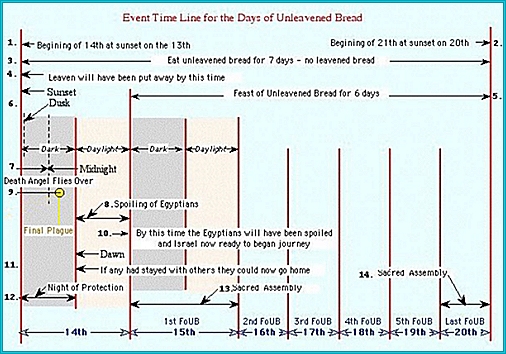
1. (Exodus 12:6, Exodus 12:18; Leviticus 23:4-5)
-- Beginning of the Night of Protection.
2. (Exodus 12:18; Deuteronomy 16:4)
-- Beginning of the 21st at sunset on the 20th.
3. (Exodus 12:15, Exodus 12:18; Exodus 13:6-7; Exodus 34:18; Deuteronomy 16:3-4, Deuteronomy 16:8)
-- Eat unleavened bread for 7 days.
4. (Exodus 12:15)
-- Leaven will have been put away by this time.
5. (Deuteronomy 16:7-8, Deuteronomy 16:20; Leviticus 23:6)
-- Feast of Unleavened Bread is for 7 days.
6. (Exodus 12:6-11; Leviticus 23:5)
-- Dusk.
7. (Exodus 12:12-14, Exodus 12:23, Exodus 12:27, Exodus 12:29)
-- Angel Of Death Flies Over.
8. (Exodus 12:33-36)
-- Spoiling of the Egyptians.
9. (Exodus 3:20-22; Exodus 11:1-10; Exodus 10:28-29; Exodus 12:10-11, Exodus 12:17, Exodus 12:23, Exodus 12:30-34, Exodus 12:46; Deuteronomy 16:4, Deuteronomy 16:7)
-- Final Plague.
10. (Exodus 12:37-42, Exodus 12:51 through Exodus 13:5; Numbers 33:1-3)
-- By this time the Egyptians will have been spoiled and Israel is now ready to began their journey.
11. (Exodus 12:23; Deuteronomy 16:4-7)
-- If any had stayed with others they could now go home.
12. (Exodus 12:14-16, Exodus 12:26-27; Leviticus 23:6-8)
-- Night of Protection.
13. (Exodus 12:16-17; Leviticus 23:5-6; Numbers 28:16-17)
-- Sacred Assembly.
14. (Exodus 12:15; Exodus 13:6; Exodus 34:18; Leviticus 23:6-8; Deuteronomy 16:8)
-- Sacred Assembly.
To see the (JPS 1917-Tanakh) Scriptures for The Timeline Chart, click HERE.

Footnotes:
[1] [a]All scriptural links point to the Bible Gateway, A Searchable Online Bible In Over 100 Versions And 50 Languages, located at "BibleGateway.Com", a vast biblical resource containing all the major texts and reference materials useful for in-depth bible studies. Most scriptual quotations are from the (KJV) of the Bible, however versions noted in (parentheses) should also be consulted. [b]All Strong's scriptural references point to the Blue Letter Bible Lexicon, located at "BlueLetterBible.Org", another vast biblical resource which has over 4,000,000 links available, pointing to more than 165,000 pages of concordances, lexicons, dictionaries, commentaries, images, and several Bible versions.
[2] Gesenius' Hebrew-Chaldee Lexicon to the Old Testament, H.W.F. Gesenius, original in 1857.
[3] Strong's Exhaustive Concordance of the Bible.
[4] Webster- Pretermission - to let pass or overlook.
[5] Webster- Exemption - immunity.
[6] Night of Protection.
[7] See the online tanach HERE.
[8] See the article: 'The Feast Of Booths'.